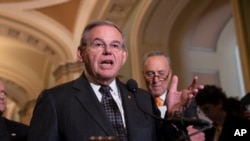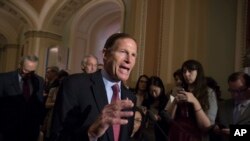The Biden administration and U.S. lawmakers are pushing this week for longtime ally Saudi Arabia to face consequences for agreeing to reduce oil production.
OPEC+, which includes Saudi Arabia, the 12 other members of the Organization of Petroleum Exporting Countries and 10 other oil-exporting nations, announced last week that it would cut its oil production target by 2 million barrels a day, despite U.S. objections.
Saudi Foreign Minister Prince Faisal bin Farhan said the decision was unanimous and based on economic considerations.
Some members of Congress are calling for an end to arms sales to Saudi Arabia. U.S. President Joe Biden signaled Wednesday he was willing to consider that proposal when Congress returns from a recess next month.
“We’re going to react to Saudi Arabia and we’re doing consultation when they come back. We will take action,” Biden told reporters.
Senate Foreign Relations Committee Chairman Bob Menendez said in a statement Monday that the Saudi decision was tantamount to underwriting Russia’s war in Ukraine. The United States has been working to sanction Russian oil exports as punishment for the unprovoked February invasion.
“There simply is no room to play both sides of this conflict – either you support the rest of the free world in trying to stop a war criminal from violently wiping an entire country off of the map, or you support him. The kingdom of Saudi Arabia chose the latter in a terrible decision driven by economic self-interest,” Menendez said.
Menendez proposed that Congress freeze all aspects of the U.S.-Saudi security relationship, including arms sales and security cooperation. Senate and House Democrats introduced a proposal late Tuesday that would halt all sales for one year.
“Saudi Arabia is clearly the driving force in this decision. It's the dominant power in OPEC+, it has been for years and so singling out Saudi Arabia makes the most sense,” Democratic Senator Richard Blumenthal, one of the bill’s co-sponsors, told reporters Wednesday.
“I believe the Saudis have consistently been miscalculating in the past couple years, and it's probably because [former U.S. President Donald] Trump candidly gave them carte blanche. A lot of the deals that were taking place over the previous administration gave them a sense of security, and what President Biden is trying to do is just return to the proper balance,” Democratic Representative Ro Khanna, another co-sponsor, told reporters.
Blumenthal and Khanna wrote Sunday in an editorial in American political publication Politico that Saudi Arabia does not have other good options for arms purchases, giving the U.S. leverage.
“Make no mistake, this is a move on oil prices that was designed,” Aaron David Miller, senior fellow at the Carnegie Endowment for International Peace and a former State Department Middle East analyst and negotiator, told VOA.
The decision to cut production comes ahead of midterm elections in the United States November 8.
“What the Saudi crown did [was] to literally undermine the president's political position, certainly with respect to oil prices, weeks before the midterms and at the same time undermine the president's position, the international community's position, in an effort to isolate [Russian President] Vladimir Putin in terms of his aggression against Ukraine by supporting him politically and economically,” Miller said.
Congressional Republicans have been less vocal about what consequences Saudi Arabia should face for the oil production target cut but have criticized the kingdom for human rights violations and other concerns in the past.
“Some of the senators from gas-producing states in the United States were deeply concerned about two years ago when Saudi Arabia and other OPEC+ [countries] took certain decisions that led to a severe drop in the price of oil. I think the broader picture is that from a bipartisan basis, the U.S.-Saudi relationship is not on a stable foundation,” Brian Katulis, vice president of policy at the Middle East Institute, told VOA.
Blumenthal told reporters he was in talks with Republicans about his legislation. Lawmakers are due to return to Washington after the midterm elections.
Cindy Spang contributed to this report.





